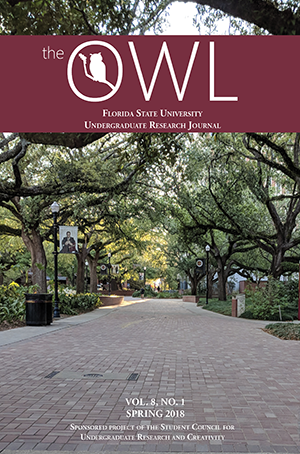Over-Due Process: Selective Incorporation, Federalism, and the Warren Court
Keywords:
selective incorporation, Earl Warren, Supreme Court, Federalism, Due ProcessAbstract
Selective incorporation played a role in adapting federalist principles to the constitutional standards of post-Reconstruction Era America. This project seeks to determine the extent of that role under Supreme Court Chief Justice Earl Warren by analyzing constitutional jurisprudence before, immediately following, and almost a century after the ratification of the Fourteenth Amendment by focusing on several key cases, including Barron v. Baltimore (1833), Palko v. Connecticut (1937), Robinson v. California (1962), and Griswold v. Connecticut (1965). My analysis indicates that the rulings and chronology of these cases demonstrate the principled, but not flawless, manner in which the Warren Court adapted Federalist ideals into compatibility with the Fourteenth Amendment through selective incorporation.
References
“I Annals of Congress.” Gales and Seaton ed., 1834.
Ghosh, Shobhamoy; Ghosh, Shovamoy. “Reviewed Work(s): Freedom & the Court: Civil Rights and Liberties in the United States by Henry J. Abraham.” The Indian Journal of Political Science, Vol. 29, No. 1 1968. Print.
Amar, Akhil Reed. “Original Meaning of the Fourteenth Amendment: Panel VI - Did the Fourteenth Amendment Incorporate the Bill of Rights against States? The Originalism, Democracy, and the Constitution.” Harvard Journal of Law & Public Policy. Vol. 19 (1995—1996): 443–450. Print.
Baggett et al. v. Bullitt et al. 377 U.S. 360 (1964).
Barenblatt v. United States. 360 U.S. 109 (1959).
Barron Ex Rel. Tiernan v. Mayor of Baltimore. 32 U.S. 243. (1833).
“The Bill of Rights: A Transcription.” National Archives. 4 Nov. 2015. Web. 27 Oct. 2016.
Boone, Tim K. “Of the New Deal Apocalypse.” Liberty Legal Journal. 2011. 8–9. Print.
Bork, Robert H. “Neutral Principles and Some First Amendment Problems.” Indiana Law Journal. 47 (1971–1972): 1–35. Print.
Brown et al. v. Board of Education of Topeka et al. 347 U.S. 483 (1954)
Carrie Buck, By R.G. Shelton v. Dr. J.H. Bell. 143 Va. 310 (1925).
“The Constitution of the United States: A Transcription.” National Archives. 4 Nov. 2015. Web. 24 Oct. 2016.
Dred Scott v. Sandford. 60 U.S. 393 (1957).
Finkelman, Paul, and Melvin I. Urofsky. Landmark Decisions of the United States Supreme Court. Cq Press, 2003.
Gideon v. Wainwright, Corrections Director. 372 U.S. 335 (1963).
Griswold v. Connecticut, 381 U.S. 479, 480 (1965).
Griswold v. Connecticut, 381 U.S. 479, 527 (1965) (Stewart & Black, JJ., dissenting).
Hamilton, Alexander. “Federalist No. 78, in The Federalist,” ed. George W. Carey and James McClellan (Indianapolis, IN: Liberty Fund, 2001), 361–362.
Kuchel, Thomas H., Edward Bennett Williams, and Francis X. Beytagh. “Earl Warren Chief Justice of the United States In Memoriam.” California Law Review. Vol. 64 (1976): 2–13. Print.
Livingston, William S. “A Note on the Nature of Federalism.” Political Science Quarterly. Vol. 67.1 (1952): 81–95. Web. 27 Oct. 2016.
Marceau, Justin F. “Un-Incorporating the Bill of Rights: The Tension Between the Fourteenth Amendment and the Federalism Concerns That Underlie Modern Criminal Procedure Reforms.” Journal of Criminal Law & Criminology 98.4 (2008): 1231–1303. Web. 26 Oct. 2016.
Miranda v. Arizona. 384 U.S. 436 (1966).
Meyer v. State of Nebraska. 262 U.S. 390 (1923).
National Association for the Advancement of Colored People v. Alabama ex rel. Flowers, Attorney General. 377 U.S. 288 (1964).
Otis McDonald, et al., Petitioners v. City of Chicago, Illinois, et al. 130 S.Ct. 3020 (2010).
Palko v. Connecticut. 302 U.S. 319 (1937)
People v. Rochin. 101 Cal.App.2d 140 (1950)
Reynolds, Judge, et al. v. Sims et al. 377 U.S. 533 (1964).
Rhoades, Lyman, and Rodney R. Patula. “The Ninth Amendment: A Survey of Theory and Practice in the Federal Courts since Griswold v. Connecticut.” Denver Law Journal. 50 (1973–1974): 153–176. Print.
Robinson v. California. 370 U.S. 660 (1962).
Rochin v. California. 342 U.S. 165 (1952)
Roth v. United States. 354 U.S. 476 (1957)
Scalia, Antonin. “Two Faces of Federalism, The Symposium on Federalism.” Harvard Journal of Law and Public Policy. Vol. 6 (1982–1983): 19–22. Print.
Slaughter-House Cases. 83 U.S. 36 (1873).
Sweezy v. New Hampshire, By Wyman, Attorney General. 354 U.S. 234 (1957).
Texas v. Johnston. 491 U.S. 397 (1989)
United States v. Cruikshank. 92 U.S. 542 (1876).
Downloads
Published
Issue
Section
License
All works published in The Owl are published under a Creative Commons Attribution, Non-Commercial, Share-Alike (CC-BY-NC-SA) license. The author retains copyright.

